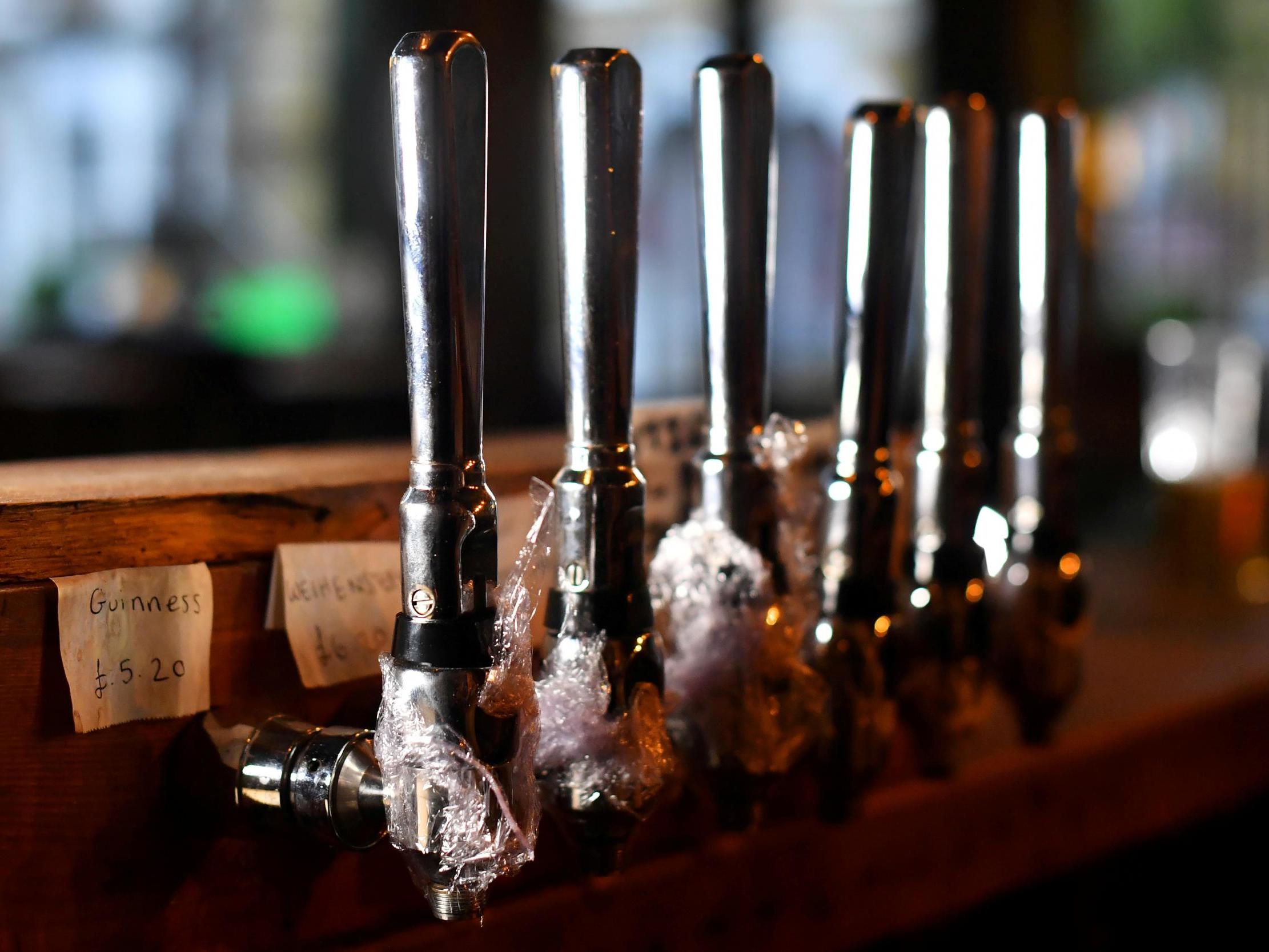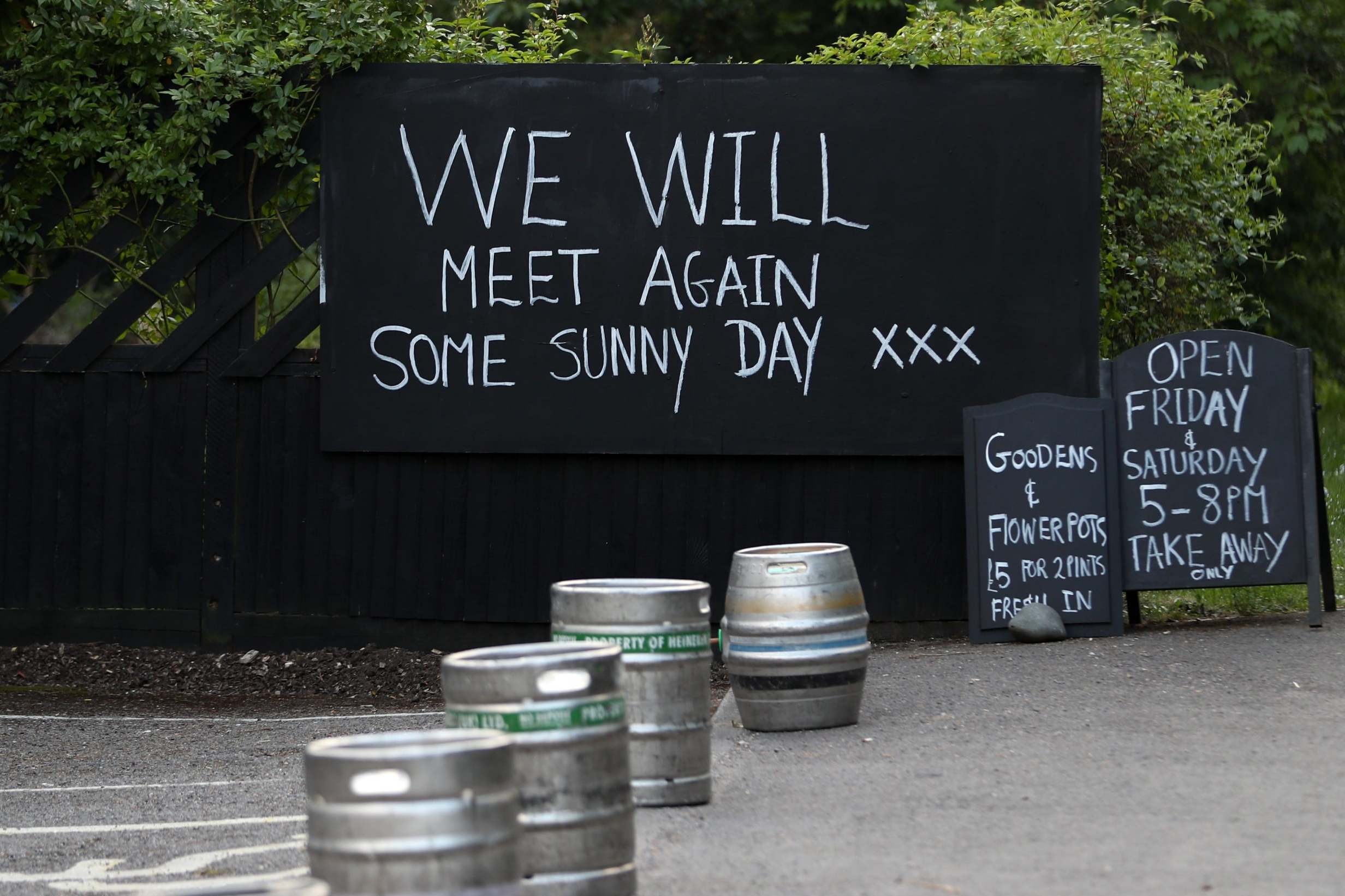‘It just won’t work’: Pub and bar owners consider calling time until next year as fears grow over socially distanced future
While the nation hopes to spend at least the closing moments of a post-lockdown summer in beer gardens and bars, businesses are questioning whether they will be able to reopen before the new year. Vincent Wood reports


Britishness has always been a loosely defined concept – an amalgam of cultures and classes, of dark histories and golden eras, of twee politeness and punk-like rage. However, through it all, pubs have been an irrefutable element of the national identity. Any country can lay claim to pies and passive aggression, but few have the same relationship with their public houses that the UK has.
So when the coronavirus crisis saw the country grind to a halt, the potential impact on late-night rounds and afternoon beer gardens became a matter of national concern – both for the nation’s wealth and its people. On a national level, the hospitality industry is the nation’s fourth largest employer, contributing more than £54bn to the UK economy with individual firms offering millions in business rates to the nation’s coffers. On an individual level, people like a pint and a catch up, especially when we’ve been forced to stay away from our friends and loved ones for weeks at a time.
“The reason that you go to a pub, and the reason that you go to a restaurant, is to sit and enjoy the company of others,” Tim Foster, owner of the Yummy Pub company, told The Independent. “Mostly those that you don’t see very often – so you do go out with your family, granted, but also we’re the conduit for people to meet up, have a beer and chat.”
Foster’s is one of the thousands of businesses left with three hours to shut up shop when the government gave the order on 20 March – leaving an entire workforce on furlough and a business frozen. However, while the present crises comes with its own obstacles, a future in which bustling social hubs must socially distance is stoking fears that businesses may have to look to relaunching not in the summer, but in the new year.
“Most of the industry is coming out now and saying it – we cannot trade with social distancing regulations,” he says. “It just won’t work. People are currently queueing for two hours outside some of Britain’s busiest supermarkets to do their weekly shop and that’s with them implementing social distancing measures – so can you imagine trying to open a pub and being told you have to put those measures in place?”
Far from the practical reality of introducing distancing measures in pubs and bars, operators are concerned that implementing harsh measures to stem the spread of the virus might create places that people don’t want to go to. While one of the industry’s biggest names, JD Wetherspoon, has signalled it thinks pubs might return in June, there is no roadmap for how to simultaneously balance social distancing rules and the atmosphere that people visit pubs to soak up.
Alex Reilly is chairman of Loungers, a cafe, bar and casual dining brand that has rapidly expanded over the last two years to become one of the sector’s fastest growing businesses. After arranging his local site so that a two-metre distance between customers and staff could be observed throughout, he realised the hit would not purely be a financial one. “I was quite shocked at the impact it had on capacity... but it’s more the way that it felt. It felt like you were effectively turning a space where people, by definition, go to socialise, into something that looked more like an exam hall.”

With tight overheads, fluctuating staffing costs and troubling business rates, hospitality firms have been warning of the risk of collapse for years. Now that risk is compounded by the astronomically high costs of leftover stock that could not be sold before lockdown, of landlords that still need to be paid off, and a future where sales will likely be dramatically curtailed.
And while impacting busy Friday and Saturday nights across the country, the problem is particularly pronounced in cities like London, where soaring rents mean that pulling in crowds of people who spill into the street in the summer months are not just preferable, but vital for the businesses survival.
Foster, whose sites include the perpetually busy Somers Town Coffee House pub in Euston, says the government will need to continue to provide furlough scheme money for staff and cash for businesses to keep the sector alive. “What the government’s got to do now is to say ‘we’ve just got to support businesses through the next phase’. If it means that pubs have got to stay closed until this time next year, then pubs have got to stay closed until this time next year. But unless they support it and unless they support us with our people... there are going to be no pubs left.”
While the Loungers business model relies more heavily on food sales, Reilly agreed the future looked tougher for those depending on drinks. “We all know of a cracking little boozer that you can go into on a Friday evening that’s jam-packed and you can barely move – and clearly those businesses are absolutely snookered until you’d imagine all of these social distancing measures have been totally relaxed.”
However Reilly believes the threat to all hospitality firms remains if a two-metre distance became the law of the land until a vaccine was developed – and that the rule will at least need to be eased to allow restaurants to function properly. He added: “If social distancing measures were introduced that were very extreme, I think there would be a real challenge around whether swathes of businesses in our sector would even opt to reopen if they were given the opportunity.
“Because actually, the economic impact on their business trading at sales levels that are going to be way below what they would ordinarily expect ... could be far greater than the business remaining in an almost hibernated state.”
How the sector comes out of lockdown remains the question and the challenge not just for pubs, bars and restaurants – but for governments trying to find a gradual way to reopen the pub doors when so many may want to flock to them. Professor Eyal Winter, an economist and expert in decision making who has advised both the UK and Israeli government, says the answer has to be clearly communicated, and above all, strict.
“A good example is traffic,” he says, explaining why the government needed to use firm tactics to enforce a gradual easing of the lockdown. “If it had been sufficient to use nudges and guidelines about how to drive, we wouldn’t need speed cameras on the street – we would deal with speeding just through guidelines. But we have speed cameras, and we have police on the street. Similarly we need some kind of enforcement mechanism when we apply the restrictions that we need to keep the [reproduction rate of the virus] below one, that’s the target, that’s the objective.”
When it comes to entertainment that could mean restrictions – like telling pubs they can only sell a limited number of pints per person – but it would also mean ensuring the business is to blame if measures are not kept up. It is an idea that has faced pushback – both from a public resistant to seeing drinks rationed, and from publicans who say it would be impractical to implement and impossible to balance against the costs of doing business.
“Pubs are a very essential cultural aspect of life in the UK, so there might be pressure to open them faster than, say, the scientists suggest”, he added, suggesting the benefits of rationing alcohol were twofold. “First of all, it is important because people have been at home for a long period, they are craving alcohol and alcohol is something you drink in company. In these circumstances people may drink more than they should, and this is not only bad for health, this is bad for violence and crime.”
The second is to create social distancing by making pubs less attractive places to stay. “People do not like to sit around in the pub if they are not allowed to drink. This is an obvious thing, if I’m seeing other people drink and I cannot have another pint, it’s not something that people like to experience.”
However the most important aspect of a lockdown plan, according to Professor Winter, is that the government is clear about what it’s doing and when it’s doing it. With Boris Johnson due to announce his roadmap for the future in the coming days, Professor Winter believes the government’s strategy must be as cast-iron a commitment as possible to allow the public to make its own plans for the future. “Now if things change with the statistics they’re allowed to change it, but as long as nothing happens they should abide by this schedule.
“The reason for this is that we don’t only have a national exit strategy, each of us has an individual exit strategy. Each of us has his own exit strategy and to implement my own exit strategy I need to know what the plan is.”
Clarity on what comes next is not just important for individual planning, but for business. In the early days of the lockdown, before government loans and furlough schemes were announced, firms were forced to trust Downing Street would catch them as they fell. “It’s the fear of the unknown that will kill you” Reilly says. “We’re all guessing and we’re all looking at other countries and we’re seeing what other measures other countries have taken, and we’re wondering whether that’s going to be something that the UK will implement”.
Looking to the future, he added: “With regards to the way we use pubs, clubs and restaurants, I really hope it just returns back to how it used to be. The thought of us not wanting to go into pubs and socialise, and not wanting to meet up with friends and family in a lounge or go to a coffee shop, is just thoroughly miserable.”
Professor Winter, who has built a career on projecting what people will do next, argues that the irrefutable nature of humanity tends towards a return to normalcy. We will meet again – and when we do, we will still reluctantly get a round in and chat nonsense late into the night.
“I’ll tell you one very optimistic thing that people overlook”, he says. “There’s a lot of apocalyptic viewing of this crisis. People are saying life will not be the same again. This is nonsense. We all went through September 11, and immediately after September 11 people said ‘life will not be the same anymore. We will not be travelling. We’ll have different vocations. We won’t go to conferences’.
“Just a few weeks afterwards, or a month, or two months afterwards – life became the same again, right? Life will become the same again here as well. There’s no doubt in my mind that that’s what will happen.”
Join our commenting forum
Join thought-provoking conversations, follow other Independent readers and see their replies
Comments
Bookmark popover
Removed from bookmarks